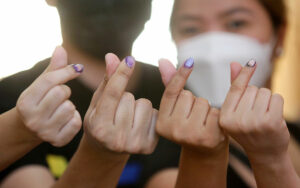
THE Commission on Elections (Comelec) is intensifying its crackdown on vote-buying ahead of the midterm elections in May by asking the Philippine central bank to order banks to flag and bar the exchange of large sums of money into smaller bills.
COMELEC WOULD MEET WITH THE BANGKO SINKKO OF THE PHILIPPINES (BSP) THIS WEEK TO CUSS THE PROPOSTAL, COMELEC chairman George Erwin M. Garcia Told BusinessWorld on the sidelines of a news briefing at the weekend.
“We will talk to the Philippine central bank so they could issue a circular to banks concerning massive exchanges of money two weeks before the election proper,” he said in an interview. “Why would you exchange P10 million or P20 million into P100 or P200 bills? Massive exchanges of money could be used for vote-buying, and that should not be allowed.”
Filipinos will pick a new set of congressmen and 12 of the 24-member Senate, along with other local officials on May 12. The Comelec has set the campaign period for Feb. 11 to May 10.
Vote-buying remains a problem in the Philippines, where candidates woo voters with cash and other giveaways. Under the law, a political bet found guilty of vote-buying faces imprisonment of up to six years and will be barred from public office.
Mr. Garcia said they expect vote-buying activities to surge in the months leading to the elections. “It won’t start in February. The real spending begins in March and April.”
“Vote-buying can only be committed at least several days before the elections, and ultimately, a day before the election. That’s what we’re really monitoring,” he added.
The election body will launch a complaint desk against vote-buying this week, he said. — Kenneth Christiane L. Basilio





